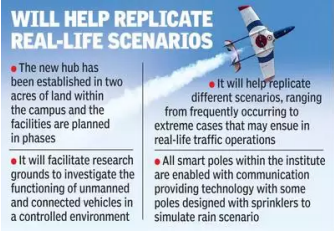Science & Technology
TiHAN-IIT: Testbed for Autonomous Navigation Systems
- 31 Dec 2020
- 5 min read
Why in News
The foundation stone of ‘TiHAN-IIT Hyderabad’, India’s first Testbed for Autonomous Navigation Systems (Terrestrial and Aerial) has been laid recently.
Key Points
- Background:
- The Department of Science and Technology (DST) had sanctioned Rs. 135 crores to IIT Hyderabad (IIT-H) under the National Mission on Interdisciplinary Cyber-Physical Systems (NM-ICPS) to set up a Technology Innovation Hub on Autonomous Navigation and Data Acquisition Systems (UAVs, RoVs, etc.)
- The Technology Innovation Hub for Unmanned Aerial Vehicles (UAVs) and Remotely Operated Vehicles (RoVs) at IIT Hyderabad, known as 'TiHAN Foundation' was incorporated as a Section-8 company by the institute in June 2020.
- It is a multi-departmental initiative including researchers from electrical, computer science, mechanical and aerospace, civil, mathematics, and design at IIT-H with collaboration and support from reputed institutions and industry.
- It is a great step towards ‘Atmanibhar Bharat’, ‘Skill India’ and ‘Digital India’.
- TiHAN-IIT:
- It will facilitate research grounds to investigate the functioning of unmanned and connected vehicles in a controlled environment by replicating different scenarios, ranging from frequently occurring to extreme cases that may ensue in real-life traffic operations.
- At present, there is no such testbed facility in India to evaluate the autonomous navigation of vehicles. Therefore, it is envisioned to address this gap by developing a fully functional and exemplary testbed facility dedicated to connected autonomous vehicles (CAVs).
- Connected vehicles use technology to either communicate with each other, connect with traffic signals, signs, and other road items, or obtain data from a cloud. This information exchange helps with safety and improves traffic flow.
- This hub focuses on addressing various challenges hindering the real-time adoption of unmanned autonomous vehicles for both terrestrial and aerial applications.
- Primary focus includes:
- Research & Technology development in the area of Autonomous Navigation and Data Acquisition Systems (UAVs, RoVs).
- Industry Collaborations :
- Joint R&D Initiatives, Consultancy, Technology Outreach Schemes, Training of Industry Personnel, Continuing Education.
- Human resource & Skill development.
- Innovation, Entrepreneurship & Start-up Ecosystem:
- Start-ups and Incubation in the Technology Vertical, Attracting Private Funding (Corporate Social Responsibility, Voluntary Contributions and equity based), Technology Commercialization.
- International Collaborations :
- Academia & Industry, Faculty/Student Exchange Programs.
- Features of TiHAN-IIT:
- Total Area:
- 2 Acres of land has already been allocated in the IIT Hyderabad campus and the facilities are planned in phases.
- Facilities:
- Test Tracks, Emulation of Real-World Scenarios, State of the Art Simulation Technologies, Road Infrastructure, Drone Runways and Landing Area, Mechanical Integration Facility, Centralized Control Room/Ground Control Station, Smart Poles etc.
- Promotion to research:
- The developed test bed will be available for use by all the industries, R&D labs, academia conducting research and development in the broad areas of autonomous navigation.
- Total Area:
National Mission on Interdisciplinary Cyber-Physical Systems
- The NM-ICPS is a comprehensive Mission aimed at complete convergence with all stakeholders by establishing strong linkages between academia, industry, Government and International Organizations. The Mission will work with all the concerned Ministries/Departments to identify their technology needs, develop solutions and technical support in CPS implementation.
- It will secure India's future by creation of a Cyber-Physical System ecosystem.
- Cyber-Physical System (CPS) combines digital/cyber elements with physical objects (e.g. machines, autonomous vehicles) and data with capabilities of communication, data collection & processing, computing, decision making and action.
- CPS is an integrated system involving Sensors, Communication, Actuators, Control, interconnected computing networks and data analytics.
- Few Potential applications: Driverless cars that communicate securely with each other on smart roads, Sensors in the home to detect changing health conditions, etc.
- The Mission has four major activities:
- Technology Development,
- Human Resource & Skill Development,
- Innovation, Entrepreneurship & Start-Up Ecosystem and
- International Collaborations.







